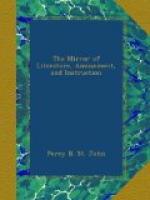Sir Richard, being called to see a patient who fancied himself very ill, told him ingenuously what he thought, and declined prescribing, thinking it unnecessary. “Now you are here,” said the patient, “I shall be obliged to you, Sir Richard, if you will tell me how I must live, what I may eat, and what not.”—“My directions as to that point,” replied Sir Richard, “will be few and simple. You must not eat the poker, shovel, or tongs, for they are hard of digestion; nor the bellows, because they are windy; but any thing else you please!”
He was first cousin to Dr. John Jebb, who had been a dissenting minister, well known for his political opinions and writings. His Majesty George III. used sometimes to talk to Sir Richard concerning his cousin; and once, more particularly, spoke of his restless, reforming spirit in the church, in the university, physic, &c. “And please your Majesty,” replied Sir Richard, “if my cousin were in heaven he would be a reformer!”—Wadd’s Memoirs.
* * * * *
THE GATHERER.
“A snapper-up of unconsidered trifles.”
SHAKESPEARE.
* * * * *
GOOD BYE.
When from the friend we dearly love
Fate tells us we must part,
By speech we can but feebly prove
The anguish of the heart.
And no soft words, howe’er sincere,
Can half so much imply,
As that suppress’d, though trembling
tear,
Which drowns the word—Good
bye.
Warwick. W.S.
* * * * *
A keen shopkeeper, having in his service a couple of shopmen, who in point of intellect, were the very reverse of their master, a wag who frequented the shop, for some time puzzled the neighbourhood by designating it a “music-shop,” although the proprietor dealt as much in music as in millstones. However, being pressed for an explanation, he said that the scale was conducted by a sharp, a flat and a natural; and if these did not constitute “music,” he did not know what did.
ISSACCAR.
* * * * *
IMMORTALITY.
Napoleon being in the gallery of the Louvre one day, attended by Baron Denon, turned round suddenly from a fine picture, which he had viewed for some time in silence, and said to him, “That is a noble picture, Denon.”—“Immortal,” was Denon’s reply. “How long,” inquired Napoleon, “will this picture last?” Denon answered, that, “with care and in a proper situation, it might last, perhaps, five hundred years.”—“And how long,” said Napoleon, “will a statue last?”—“Perhaps,” replied Denon, “five thousand years.”—“And this,” returned Napoleon, sharply, “this you call immortality!”
* * * * *




